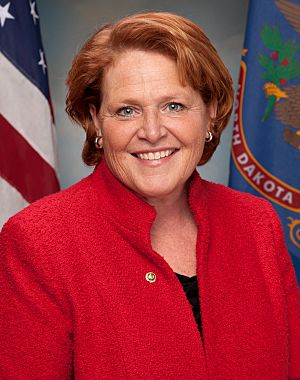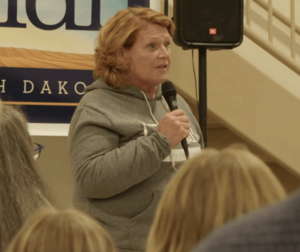Heidi Heitkamp facts for kids
Quick facts for kids
Heidi Heitkamp
|
|
|---|---|

Official portrait, 2013
|
|
| United States Senator from North Dakota |
|
| In office January 3, 2013 – January 3, 2019 |
|
| Preceded by | Kent Conrad |
| Succeeded by | Kevin Cramer |
| 28th Attorney General of North Dakota | |
| In office December 15, 1992 – December 15, 2000 |
|
| Governor | Ed Schafer |
| Preceded by | Nicholas Spaeth |
| Succeeded by | Wayne Stenehjem |
| 20th Tax Commissioner of North Dakota | |
| In office December 2, 1986 – December 15, 1992 |
|
| Governor | George Sinner |
| Preceded by | Kent Conrad |
| Succeeded by | Robert Hanson |
| Personal details | |
| Born |
Mary Kathryn Heitkamp
October 30, 1955 Breckenridge, Minnesota, U.S. |
| Political party | Democratic (D-NPL) |
| Spouse | Darwin Lange |
| Children | 2 |
| Relatives | Joel Heitkamp (brother) Jason Heitkamp (cousin) |
| Education | University of North Dakota (BA) Lewis & Clark College (JD) |
Mary Kathryn "Heidi" Heitkamp (born October 30, 1955) is an American lawyer and politician. She made history as the first woman elected to be a United States senator from North Dakota. She served in the Senate from 2013 to 2019.
As a member of the North Dakota Democratic–Nonpartisan League Party, Heitkamp held important jobs in North Dakota's state government. She was the state's tax commissioner and later the attorney general, which is the top lawyer for the state. As of 2025, she is the last Democrat to have won an election for a statewide office in North Dakota.
After her time in the Senate, Heitkamp has worked as a contributor for the news channel CNBC. She also helps teach at universities like the Harvard Kennedy School and the University of Chicago Institute of Politics.
Contents
Early Life and School
Heidi Heitkamp was born in Breckenridge, Minnesota. She was the fourth of seven children. Her mother was a school cook, and her father was a janitor and construction worker. She grew up in the small town of Mantador, North Dakota.
In first grade, she started using the nickname "Heidi" because two other girls in her class were named Mary and Kathy.
For college, she went to the University of North Dakota and graduated in 1977. After that, she went to Lewis & Clark Law School to earn her law degree in 1980.
Career in North Dakota
After law school, Heitkamp worked as a lawyer for the government. She first worked for the Environmental Protection Agency. Then, she became a lawyer for North Dakota's tax commissioner, Kent Conrad.
In 1986, Heitkamp was chosen to be the North Dakota Tax Commissioner. This job involves overseeing the state's tax system. She was later elected to the position and served until 1992.
North Dakota Attorney General
In 1992, Heitkamp was elected as the Attorney General of North Dakota. The attorney general is the state's main lawyer and law enforcement officer. She was reelected in 1996.
One of her major achievements was leading the state's legal case against big tobacco companies. This was part of a nationwide effort that led to the Tobacco Master Settlement Agreement, which made tobacco companies pay for health-related damages.
Running for Governor
In 2000, Heitkamp ran for governor of North Dakota. During her campaign, she faced a serious health challenge when she was diagnosed with breast cancer. She recovered and continued her campaign. She lost the election to Republican John Hoeven.
Serving in the U.S. Senate
In 2011, Heitkamp announced she would run for the U.S. Senate. The U.S. Senate is a part of Congress where each state has two representatives, called senators. They help make laws for the whole country.
2012 Election
The election in 2012 was very close. Heitkamp won by less than one percent of the vote, defeating Republican Rick Berg. Her victory made her the first woman ever elected to the U.S. Senate from North Dakota.
As a senator, Heitkamp worked with members of both the Democratic and Republican parties. She served on important committees that dealt with farming, banking, and homeland security.
2018 Election
Heitkamp ran for a second term in 2018. She faced Republican congressman Kevin Cramer. In a newspaper ad, her campaign made a mistake by including the names of some people without their permission, and she apologized for it.
On November 6, 2018, Cramer won the election. Heitkamp's time as a senator ended on January 3, 2019.
Life After the Senate
After leaving Washington, D.C., Heitkamp did not stop working. She became a contributor on the TV news channel CNBC, where she shares her opinions on politics and the economy.
In 2019, she started the One Country Project with another former senator, Joe Donnelly. The group's goal is to help the Democratic Party better understand and connect with voters in rural areas.
In 2023, she became the director of the University of Chicago Institute of Politics. This institute helps get young people interested and involved in politics and public service.
Political Views
Heitkamp is known as a moderate, or centrist, Democrat. This means her views were often in the middle, and she was willing to work with both Democrats and Republicans.
- Working Together: She often supported laws that had bipartisan support, meaning both parties agreed on them.
- Healthcare: Heitkamp believed the Patient Protection and Affordable Care Act (also known as Obamacare) had good parts but needed to be improved.
- Economy: She supported a balanced budget for the government and wanted to help North Dakota's economy by supporting its businesses.
- Energy: Heitkamp supported developing different energy sources, including oil, gas, and renewable energy like wind power. She was a supporter of the Keystone XL pipeline.
- Gun Laws: She often supported gun rights and had a high rating from the National Rifle Association.
- Supreme Court: She voted to confirm President Trump's nominee Neil Gorsuch to the Supreme Court but voted against Brett Kavanaugh.
Personal Life
Heitkamp is married to Darwin Lange, a doctor. They have two grown children, a daughter named Ali and a son named Nathan. The family lives in Mandan, North Dakota.
She is a survivor of breast cancer, which she was diagnosed with in 2000. She is a member of the Catholic Church.
See also
 In Spanish: Heidi Heitkamp para niños
In Spanish: Heidi Heitkamp para niños
- List of female state attorneys general in the United States
- Women in the United States Senate
 | Precious Adams |
 | Lauren Anderson |
 | Janet Collins |


